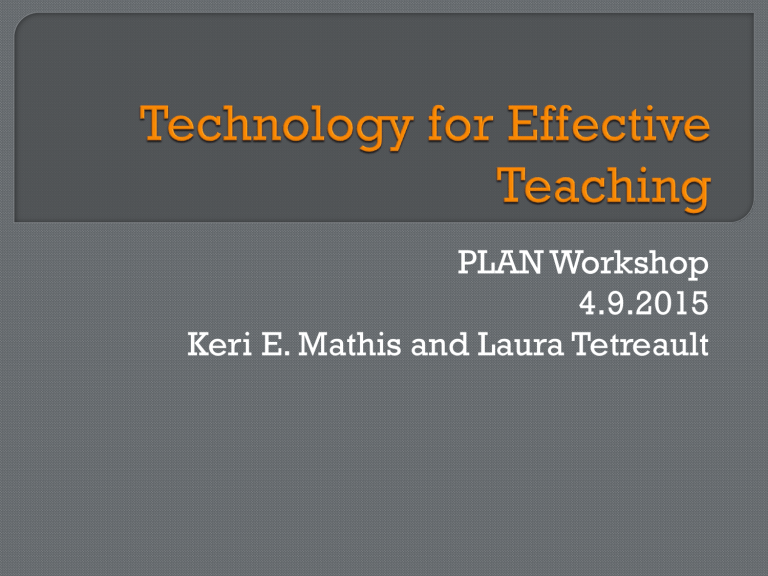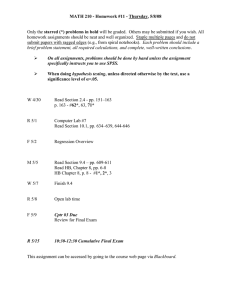PLAN Workshop 4.9.2015 Keri E. Mathis and Laura Tetreault

PLAN Workshop
4.9.2015
Keri E. Mathis and Laura Tetreault
A Google doc link was sent to you – check your email and respond to the prompt!
Have students store all freewrites, exercises, and group activities in a Google Drive folder, shared with each other and the instructor (I count this as part of class participation)
Have students do research during class (for their own projects, for examples, etc.) and post their findings on a Blackboard discussion forum or other shared location
(like a class blog)
Integrate media into the class such as
YouTube videos, TED talks, memes, images, audio—as something to build class discussion around, or something to give students a task to find (makes a topic accessible and expands students’ parameters for what they consider research)
Have students write discussion responses on a Blackboard forum or blog, then integrate these into class by having them read postings during class and do activities surrounding them
•
• Looking for common themes
Noting points of interest
• Using discussion board posts as mini research data
Students better prepared for discussion
Integrate online activities like discussion board posting, blogging, or social media as part of the participation grade
Comment on student work using Word track changes, Google Drive comments,
Blackboard, or some combination of these
Build both small and large scale digital assignments
• Small scale: weekly blogging
• Large scale: digital assignment like building a multigenre advocacy campaign
http://punya.educ.msu.edu/research/tpck/
According to Cynthia Selfe, we should implement technology by considering …
People
Instruction
Technology
Learning-Centered Teaching
Backwards Design
Bloom’s (Digital) Taxonomy
INSTRUCTION-CENTERED
Provide/deliver instruction
Transfer knowledge
Offer courses and programs
Improve instruction
Provide access for diverse students
LEARNING-CENTERED
Produce learning
Elicit students' discovery and construction of knowledge
Create powerful learning environments
Improve the quality of learning
Achieve success for diverse students
“ Backward design begins with the end in mind:
What enduring understandings do I want my students to develop?”
Identify desired results (learning outcomes)
• “ What should students know, understand, and be able to do? What is worthy of understanding? What enduring understandings are desired?”
Determine Acceptable Evidence
• “ How will we know if students have achieved the desired results and met the standards? What will we accept as evidence of student understanding and proficiency?”
Plan learning experiences and instruction. This includes:
•
•
• definition of knowledge (know-that), skills and procedures (know-how) students ought to master definition of materials definition of learning /teaching activities (scenarios).
Concept-in-90
• Have students create a video that explains an argument or a concept related to the course in
90 seconds
Re-mix Assignments
• Have students revise a previous assignment by turning into a digital text
What are the outcomes you are hoping to achieve?
In what part of the process would utilizing technology help you? How and why?
What technologies are you prepared to use?
What technologies are your students prepared to use?
How much time and support do you have?
How is it going? What do I need to do differently?
Using the sample assignments/technologies in this presentation and on the handout provided, collaborate with a partner and choose one or two technologies that you are interested in exploring and explain why.
Emailed post-session
kemath01@louisville.edu and l0tetr01@louisville.edu

